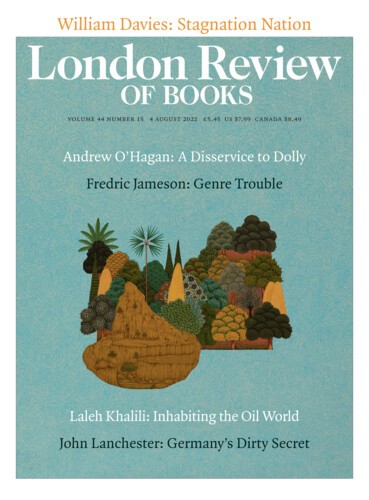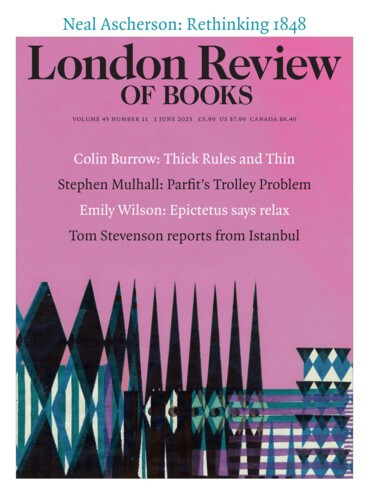Emily Wilson
Emily Wilson is a professor of classical studies at the University of Pennsylvania. Her translation of the Iliad is due in September.
I have gorgeous hair: Epictetus says relax
Emily Wilson, 1 June 2023
The first-century Stoic philosopher and teacher Epictetus was an enslaved person who succeeded in getting an education and, eventually, his freedom. Images of freedom, slavery and self-belonging (oikoiesis) recur in his teaching. ‘A slave is always praying to be set free,’ he writes. He evokes the horrors of enslavement by describing the suffering of caged animals and birds...
Podcasts & Videos
Among the Ancients: Aristophanes
Emily Wilson and Thomas Jones
In this sample episode from their forthcoming Close Readings series, starting next year, Emily Wilson talks to Thomas Jones about the comedies of Aristophanes, in particular Clouds and Lysistrata.
Aeschylus’ Ghosts
Emily Wilson and Thomas Jones
Emily Wilson talks to Thomas Jones about three new translations of the Oresteia. They discuss what the texts of the tragedies may tell us about the state of democracy in fifth-century Athens, the difficulties...
Pieces about Emily Wilson in the LRB
Good Jar, Bad Jar: Whose ‘Iliad’?
Ange Mlinko, 2 November 2023
‘When women are marginalised, enslaved and silenced, very few men will be capable of any form of kindness,’ Emily Wilson remarks. It is no small thing for Homer to have noticed.
Light through the Fog: The End of the Epithet
Colin Burrow, 26 April 2018
Should a translator try to shine a light through the fog or to replicate it? What makes that question so hard to answer is that fog isn’t all there is in The Odyssey. Wary manoeuvrings through the mists...
Fratricide, Matricide and the Philosopher: Seneca
Shadi Bartsch, 18 June 2015
How much weight should we give to unpleasant revelations about the private lives of thinkers? It partly depends on what kind of thinker we’re talking about. When it was discovered a few...
Dying to Make a Point: Death and the Ancients
Shadi Bartsch, 15 November 2007
Socrates in his cell, drinking hemlock. Cato at Utica, disembowelling himself not once but twice. And Seneca, with cuts in his arms and legs, waiting for the blood to trickle out of his...
Into Extra Time: Living too long
Deborah Steiner, 23 February 2006
So great was the Greeks’ concern with living too long – what Emily Wilson calls ‘overliving’– that they had a cautionary myth about it. The immortal rosy-fingered...
Read anywhere with the London Review of Books app, available now from the App Store for Apple devices, Google Play for Android devices and Amazon for your Kindle Fire.
Sign up to our newsletter
For highlights from the latest issue, our archive and the blog, as well as news, events and exclusive promotions.


